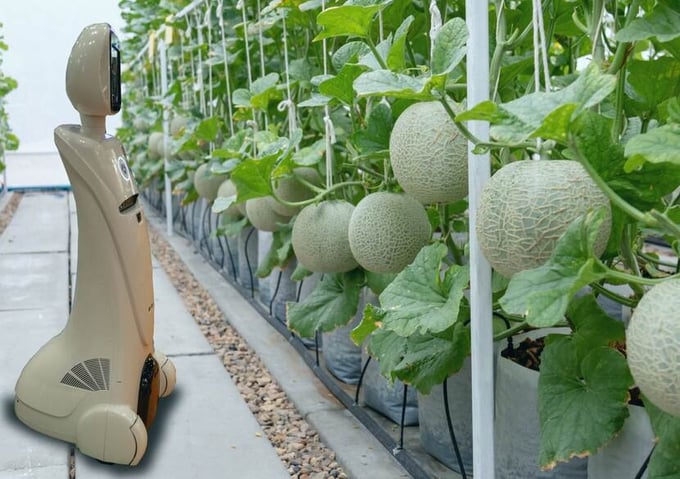May 29, 2025 | 19:33 GMT +7
May 29, 2025 | 19:33 GMT +7
Hotline: 0913.378.918
May 29, 2025 | 19:33 GMT +7
Hotline: 0913.378.918

Belgium is a leading country in applying digital technology in agriculture. Photo: ICD.
Digital transformation is creating a revolution in the agricultural sector worldwide, improving productivity and sustainability. Belgium, a country with a highly developed agricultural sector, is at the forefront of this revolution. The Belgian agricultural sector is highly productive, focusing on high-value crops, livestock, and horticulture. Belgium is known for its hi-tech agriculture with an emphasis on innovation, particularly in the Flanders region, which leads in horticulture and precision farming.
The Belgian agricultural sector is emerging with key technologies and innovations such as precision farming, decision-making systems based on big data analytics, smart greenhouses, and blockchain applications for traceability. Belgium is one of leading countries in precision agriculture, utilizing technologies like GPS-guided tractors, soil sensors, and drones.
According to Agoria (2023), 70% of farms in Flanders use precision farming technology, reducing input costs by up to 20% and increasing productivity by 10-15%. Additionally, the use of data analytics in farming has developed significantly, supported by platforms like WatchITgrow, which help farmers monitor crop growth, analyze weather, and optimize fertilizer use (ILVO 2022). This platform has increased productivity by up to 12% in pilot projects.
The Belgian horticulture sector benefits from smart greenhouses equipped with IoT (Internet of Things) devices that monitor environmental conditions, reducing energy consumption by 30% and water consumption by 20% (Proefcentrum Hoogstraten 2023).
Blockchain technology applied in Belgian agriculture ensures food traceability, which is crucial for meeting EU food safety standards. The EU's "Farm to Fork" strategy promotes the use of blockchain to increase supply chain transparency and consumer trust.
To promote research and the widespread application of advanced technologies and innovative agricultural systems, the Belgian government has introduced appropriate mechanisms and policies to support human resource development and integrate sustainable development goals.
The Belgian Government, in collaboration with regional authorities, provides grants and funding for agricultural innovation. In 2022, over 50 million euros were allocated for digital transformation projects under the "Digital Belgium" plan. Alongside this plan, Belgium invests in farmer training through initiatives like the smart agriculture project, which offers digital skills courses and practical training with new technologies.
In 2023, more than 5,000 farmers participated in these programs. Digital tools are integrated into policies to reduce emissions and improve resource efficiency, aligning with the goals of the European Green Deal. Belgium aims to reduce pesticide use by 50% and achieve carbon-neutral agriculture by 2050.

Belgium invests in farmer training through smart agriculture initiatives. Photo: ICD.
Vietnam can learn from Belgium's success in precision agriculture by subsidizing equipment such as GPS-guided machinery and soil sensors. Pilot projects could be implemented in the Mekong Delta and Red River Delta, key rice-producing areas. Additionally, a national data platform similar to Belgium's WatchITgrow could be developed, enabling Vietnamese farmers to access real-time data on weather, soil conditions, and market trends. Investing in these platforms would help producers make decisions based on cost optimization (reducing waste) and increasing crop yields.
Investing in blockchain technology can improve traceability, ensuring food safety standards, which is crucial for Vietnam's export markets. Blockchain also allows small farmers to connect directly with consumers, enhancing transparency and trust.
To promote the development and application of technology and innovation systems, collaboration between technology companies, research institutes, and farmers should be encouraged to identify specific needs and find solutions tailored to Vietnam. Initiatives could focus on localized solutions, such as developing smart irrigation systems for arid areas.
Agricultural policies should also be aligned with broader digital transformation strategies, establishing clear targets for technology adoption by 2030. This includes creating a legal framework that supports innovation, encourages investment, and integrates digital tools into national sustainability goals.
Vietnam's agricultural sector could collaborate with domestic universities and international organizations to expand digital skills training programs. The Belgian agricultural model could be adapted in training programs for mobile app use and data analysis.
Belgium's successful digital transformation in agriculture offers valuable lessons for Vietnam. By adopting similar technologies and policies, Vietnam can modernize its agriculture, improve sustainability, and enhance food security. Strategic investments, comprehensive training programs, and government support policies will be essential to drive this transformation.
Former Minister Counsellor – Embassy of Vietnam in the Kingdom of Belgium

(VAN) Vikas Rambal has quietly built a $5 billion business empire in manufacturing, property and solar, and catapulted onto the Rich List.

(VAN) Available cropland now at less than five percent, according to latest geospatial assessment from FAO and UNOSAT.

(VAN) Alt Carbon has raised $12 million in a seed round as it plans to scale its carbon dioxide removal work in the South Asian nation.

(VAN) Attempts to bring down the price of the Japanese staple have had little effect amid a cost-of-living crisis.

(VAN) Fourth most important food crop in peril as Latin America and Caribbean suffer from slow-onset climate disaster.

(VAN) Shifting market dynamics and the noise around new legislation has propelled Trouw Nutrition’s research around early life nutrition in poultry. Today, it continues to be a key area of research.

(VAN) India is concerned about its food security and the livelihoods of its farmers if more US food imports are allowed.